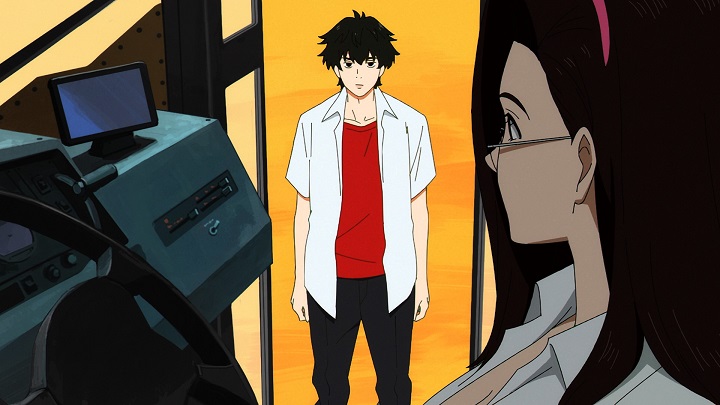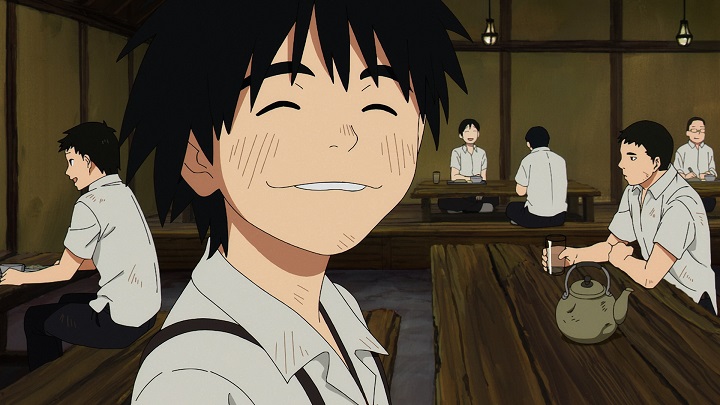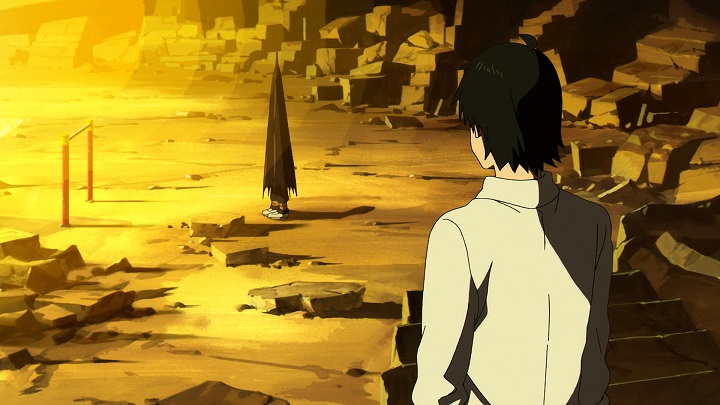Welcome all to another (late) episode of Sonny Boy! Some of you may wonder why these take so longer for me to put out but the answer is rather simple: I don’t know what the hell to write until I sit down and just wing it! So without further ado lets do just that and dive into the episode.
Once again I want to start with my overall thoughts: It was pretty good! Sonny Boy felt a lot more… focused? Compact? What I’m trying to say is that everything in this episode felt more connected. That it all filtered back to the same concept, the same idea, and worked to support it. The visuals were often still art-house-y of course, that’s just Sonny Boy. But they were restrained enough that they didn’t take away from what the episode was trying to say. Compare that to last week, or others before, where the visuals were so abstract it was often difficult to tell how they fit the story that was happening. As for the subject of the episode itself? Lets talk about that.

Last week, as one of the characters so aptly put it, we saw the class graduate. Not only from school but from their solo-fantasy island adventure. No longer are they alone, no longer can they just sit statically on the island. Now is the time to move on, to build a new life in these worlds. As such, this week seemed to be “Life after school”, an almost direct analogue to growing up, and we see Sonny Boy prepare a variety of angles to explore that. From many students entering what seems like the “Military” with Mrs. Aki to Rajidani literally getting into a boat and sailing off into the sunset, living off the ground. What this week chooses to focus on however is seemingly the most common life path: That of the average salaryman.
Before we talk about the salaryman though I need to talk about the society the salaryman takes place in. As we learned last week our class is neither alone nor the first here. Many other classes have been brought here and, over time, they have created their very own society. Yet what is interesting about this society is that despite being cut off from reality, despite having fantasy lands and all the power in the world, they build the exact same society they left. They fall right into the status quo, rebuilding what they knew, without ever trying to change or improve it. They do this to the extent of having over 600,000 meetings, a very “Japanese” thing to do. And as if to highlight the absurdity of it all Sonny Boy has positions of power in this society represented by head socks or umbrella’s almost mocking them.

With that out of the way we can finally talk about the salaryman! And if I’m being honest, I really liked what Sonny Boy did here. It was a great depiction of the pointless busy work, the unquestioning, unblinking life of many white color jobs. Doing what they are told regardless of how nonsensical or pointless the orders, such as carrying building materials down a tower. Only to then be paid a pittance to spend at stores that all filter back to those at the top, those who rule through the illusion that there is a way to climb up. It’s all a rather bleak view of the salaryman lifestyle. Yet regardless of if I agree with it or not I appreciated how well thought out this world and its presentation was. And I think what really made it work, the capstone in the episode, was Futatsuboshi.
Futatsuboshi is the quintessential salaryman. He does his job without question for hundreds of years, content to try and find happiness in his little corner of the world. He’s kind, helpful, loving and goes out of his way to care for those around him. And the moment he deviates from that and starts to dream, however small, he’s devoured by them and spat back out to be replaced by another nigh identical salaryman. The system never notices, it never wavers. It’s an incredibly bleak take on the life style but one I came to empathize with purely through Futatsuboshi’s time with Nagara.

Of course there’s a lot of symbolism that I didn’t have the time or the eloquence to touch on this episode. Stuff like Rajidani’s ant enclosure, another metaphor for the salaryman life, and Nagara’s disdain for it. Or the beautiful threads hung by the worms to lure in prey. Like the false dreams and opportunities held aloft by those in power, the lie they you can one day join them, only to be devoured by them. The whole concept of changing your point of view, of flipping the whole world upside down and going against the norms to see the truth. Sonny Boy is ripe with these metaphors and I would never get these posts done if I tried to list them all. Hell I’m arguably barely getting them done as is, because how do you write a weekly post about something as dense as this while keeping it short?
So yeah, all in all I would say this was a pretty good episode of Sonny Boy. I would almost go so far as to say the idealized version of the show. Interesting visuals that are restrained enough to not take away from the narrative. A narrative that speaks to a common human experience. All the while both fit together into a larger whole about adolescence and that transitionary period in life where you are neither a child nor a grown adult. Hopefully Sonny Boy can keep this up. Hopefully the rest of the episodes will be just as good, just as well put together, as this one. They probably won’t be. Sonny Boy will probably flounder in its last few episodes as its many different messages become tangled. But if I can at least get another one of these? I’ll be happy.




